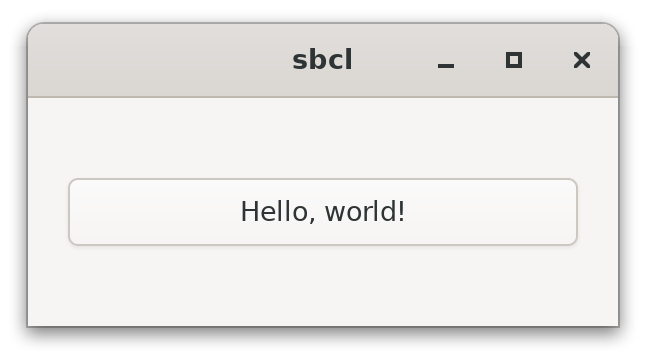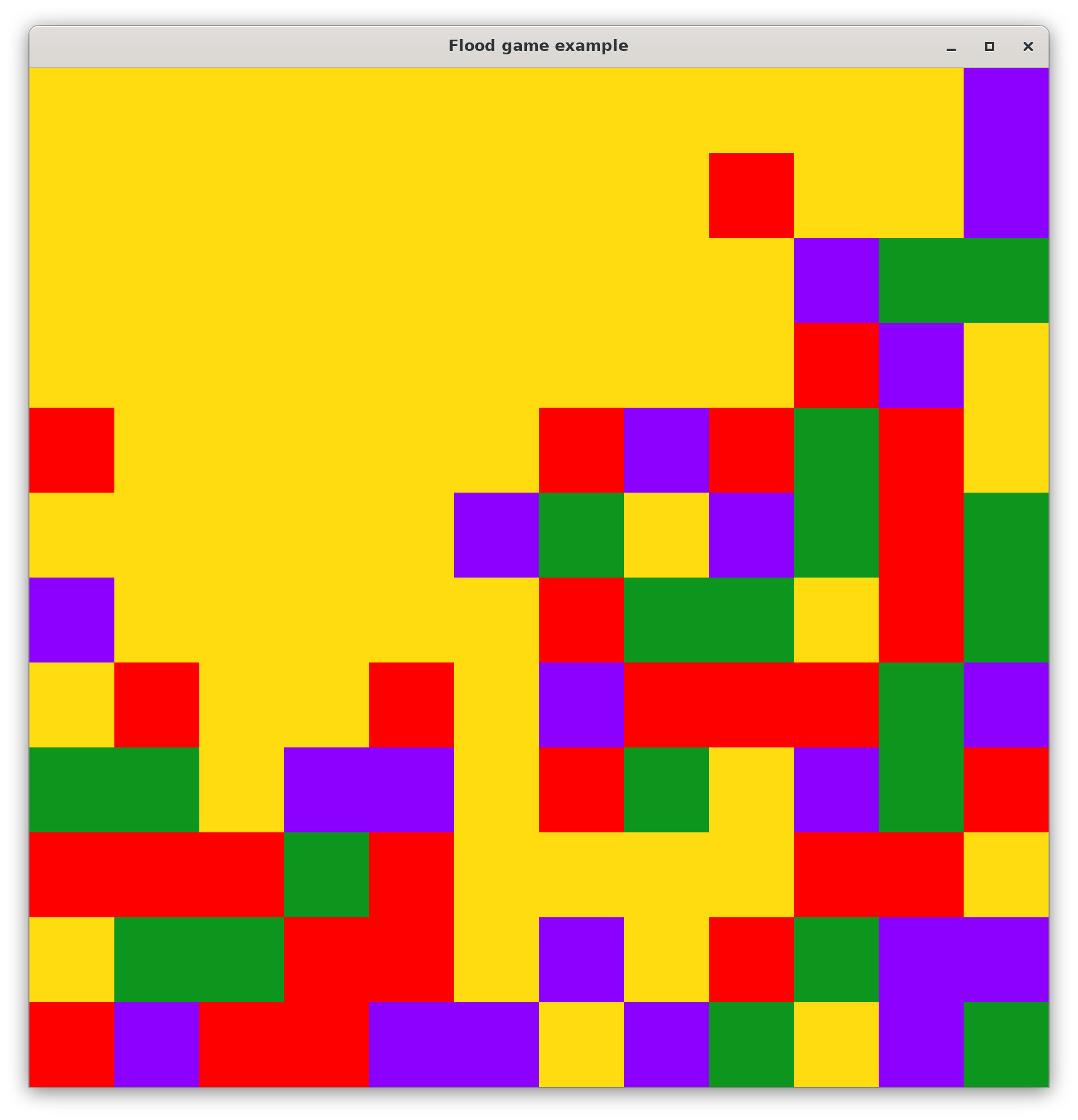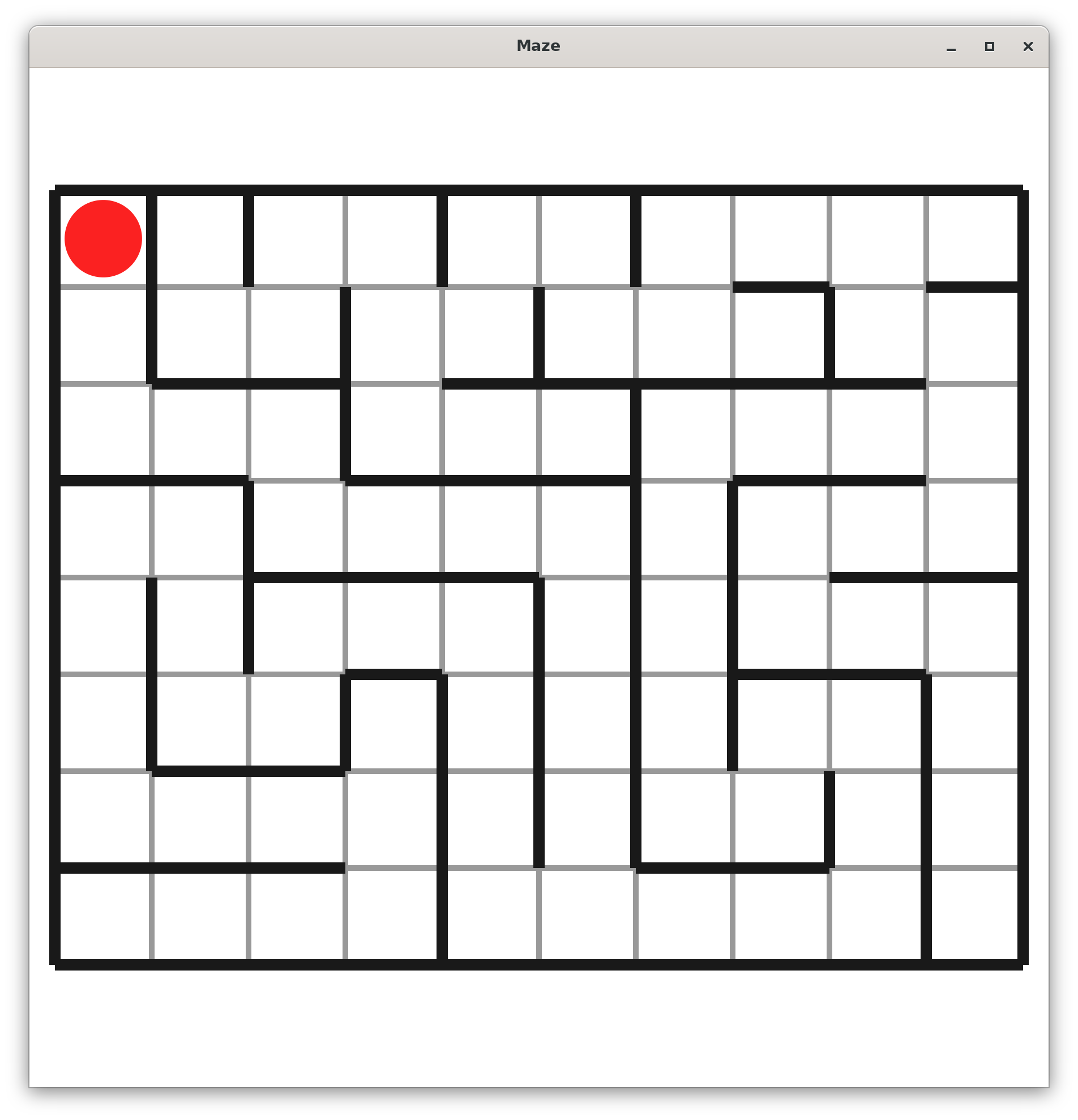Common Lisp bindings to gobject-introspection.
(defvar *gtk* (gir:require-namespace "Gtk" "3.0"))
(gir:invoke (*gtk* 'init) nil)
(let ((window (gir:invoke (*gtk* "Window" 'new)
(gir:nget *gtk* "WindowType" :toplevel))))
(gir:invoke (window 'show))
(gir:invoke (*gtk* 'main)))(defvar *gio* (gir:require-namespace "Gio"))
(defvar *gtk* (gir:require-namespace "Gtk" "4.0"))
(let ((app (gir:invoke (*gtk* "Application" 'new)
"org.gtk.example"
(gir:nget *gio* "ApplicationFlags" :default-flags))))
(gir:connect app "activate"
(lambda (app)
(let ((window (gir:invoke (*gtk* "ApplicationWindow" 'new) app)))
(gir:invoke (window 'show)))))
(gir:invoke (app 'run) nil))More examples may be found in an examples directory.
Interface with the GObjectIntrospection is based on repositories. Main function which creates an instance of a repository is
(gir:require-namespace repository-name [version])Examples:
(gir:require-namespace "GLib")
(gir:require-namespace "Gtk" "4.0")Returns interface to repository with name repository-name.
In gobject object system, repository, class, enumeration are all kind of namespace. To get a function/const/enum/class from the repository is kind of namespace access, to get a method from object is kind of namespace access too. So that concept is introduced into cl-gobject-introspection too. A function named nget (namespace get) is use to do namespace accessing as follow,
(gir:nget *gtk* "WindowType" :toplevel) ; get enum value
(gir:nget *gtk* "Window" 'new) ; get a class constructor function
(gir:nget *window* 'add) ; get a methodTo call a method of object, we need to get the method from function, then call it.
(funcall (gir:nget *gtk* "Window" 'new) 0)To save some typing, a macro named invoke is introduced as follow,
(gir:invoke (*gtk* "Window" 'new) 0)In this way, (*gtk* "Window" 'new) can be seen as function and 0 can
be seen as parameters.
(gir:invoke (repository func-name) func-arg ...) -> any
repositry : repository
func-name : (or string symbol)
func-arg : any
(gir:nget repository const-name) -> any
repository : repository
const-name : (or string symbol)
(gir:nget repository enum-name enum-value-name) -> integer
repositry : repository
enum-name : (or string symbol)
enum-value-name : keyword
(gir:nget repository class-name constructor-name) -> function
repositry : repository
class-name : (or string symbol)
constructor-name : (or string symbol)The nget takes all arguments except the first one as names of foreign
objects. Name could be a string or a symbol. In both cases it is
allowed to replace _ with -. So you can write either "get_name"
or ’get-name with the same result. If you use symbol its name is
downcased.
If second argument of nget is a name of function, nget will get the function object. And we can use invoke macro for more concise syntax.
(defvar *gtk* (gir:require-namespace "Gtk" "3.0"))
(gir:invoke (*gtk* 'init) nil)gtk_init is called with an empty array.
If second argument of nget is a name of constant, then it returns value of the constant. For example,
(gir:nget *gtk* "MAJOR-VERSION")returns 2 for GTK2 or 3 for GTK3.
If second argument of nget is a name of enumeration, then third
argument should be value name. It returns integer value. Value name
must be keyword. Any other symbol or string will mean, that you
want get a method with that name.
For example,
(gir:nget *gtk* "WindowType" :toplevel)Returns 0.
If second argument of nget is a name of class (or struct), then the third argument should be a name of class constructor (in GTK it is usually "new"), and we can use invoke here too. In GTK classes have names beginning with capital char, so you have to use either string or symbol like ’|Window|.
(defvar *window* (gir:invoke (*gtk* "Window" 'new) 0))This call will return a representation of object.
(gir:invoke (object method-name) method-arg ...) -> any
object : gir-object
method-name : (or string symbol)
method-arg : anyTo get the method of an object, the second argument of nget should be
either name of method (string or symbol) or keyword with special
meaning. Invoke can be used for the more concise syntax.
(gir:invoke (*window* 'add) button)will call method "add" with argument in variable "button".
To get C pointer to an object, use this-of.
(gir::this-of *window*)It is possible to make an object from a pointer:
(defvar *window-from-ptr* (gir:build-object-ptr (gir:nget *gtk* "Window") window-ptr))window-ptr should be cffi:foreign-pointer here.
Getting and setting field values are done with field and setf.
(defvar *entry* (gir:invoke (*gtk* "TargetEntry" 'new) "ok" 0 0))
> (gir:field *entry* 'flags)
0
> (setf (gir:field *entry* 'flags) 1)
> (gir:field *entry* 'flags)
1But you cannot set with :set-field! complex types such as structs, unions or even strings. It is a restriction of GObjectIntrospection.
Getting and setting property are done with property and setf.
(gir:property *window* 'width-request)
(setf (gir:property *window* 'width-request) 100)(gir:connect object signal-name handler) -> void?
object : gir-object
signal-name : (or symbol string)
handler : (or function cffi:foreign-pointer string symbol)Connects signal handler to object. If handler is a string o symbol, then it denotes C-function.
Various description information, such as a signature of a function, can be gotten via the description functions.
(gir:nget-desc *gtk* 'init)
#F<init(#V<argv: (SEQUENCE STRING)>): (#V<RETURN-VALUE: VOID>
#V<argv: (SEQUENCE STRING)>)>

